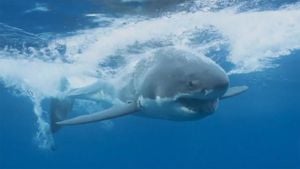Angela Merkel, the former Chancellor of Germany, has shed light on her controversial decision to delay Ukraine's bid to join NATO during her 16 years in office. This has surfaced through excerpts from her upcoming memoir, Freedom: Memoirs 1954 - 2021, published by Die Zeit. Merkel’s justification highlights her apprehensions about provoking Russia and the potential for military retaliation under Vladimir Putin’s regime.
Reflecting on the pivotal NATO summit held in Bucharest in 2008, where Ukraine’s and Georgia’s aspirations for Membership Action Plan (MAP) status were denied, Merkel expressed her grasp of the urgency felt by Central and Eastern European nations to accelerate their NATO membership. She conveyed, "I understand the desire of Central and Eastern European countries to join NATO quickly. Nevertheless, admitting new members requires more security not solely for them but for the alliance as well." This acknowledgment reveals her position as one rooted not only in political acumen but also strategic prudence.
Merkel identified the specific threat posed by Russia’s Black Sea Fleet stationed on the Crimean Peninsula, articulately stating, "None of the potential NATO candidates had such close ties to Russian military structures." This was pivotal especially considering the historical tensions surrounding Crimea—territory later annexed illegally by Russia in 2014. It provided Merkel with significant reasons to deliberate on how NATO's expansion would tangibly affect the security calculus of the entire alliance.
Throughout her memoir, Merkel expresses skepticism about the belief held by some NATO officials and members at the time—that granting Ukraine and Georgia MAP status could act as sufficient deterrence against Putin’s aggressive posturing. She classified the notion as "an illusion," contemplating the adequacy of NATO being able to respond militarily should the need arise, and whether she could secure support within the Bundestag for such measures.
Despite these underlying concerns, Merkel revealed the conundrum faced by NATO leaders: the reality of their ambiguous promises. She articulated, "The fact Georgia and Ukraine did not receive MAP commitment was, in essence, a ‘no’ to their aspirations. Yet, NATO’s general promise of future membership was interpreted by Putin as ‘yes’ to NATO membership for both countries—a declaration of war." This perception is deeply pertinent as it acknowledges how diplomatic communication can be misconstrued, particularly by aggressive state actors.
Fast forward to today—amidst the full-scale war being waged by Russia against Ukraine—Merkel's reflections seem to resonate with renewed significance. Ukraine's current leadership has taken resolute steps to accelerate NATO membership aspirations, highlighted by the submission of their fast-track application late last year. Ukrainian President Volodymyr Zelenskyy has underscored NATO’s backing as integral to Ukraine’s victory plan against the Russian invasion. Nevertheless, the avenue for membership remains complex, with NATO allies maintaining the stance of allowing Ukraine access only after the war concludes.
Ongoing fears linger among Ukrainian officials concerning shifts in Western policies, especially with the potential return of former President Donald Trump to office. Zelenskyy’s administration aims to secure NATO's invitation on solid footing before any significant changes occur within American political dynamics.
The battle lines drawn by the NATO summit discussions over the years have echoed across both Ukraine's defense policy and its relationships with Western allies. Ukraine's pathway to NATO, officially labeled as irreversible, is fraught with challenges, with NATO emphasizing its condition of peace as necessary for membership consideration.
Merkel’s reflections are intertwined with historical outcomes and the strategic reality at the time. Over the years, she faced backlash for Germany's energy dependence on Russia and perceived leniency toward Moscow. Critics, including Ukrainian President Zelenskyy, have condemned her administration’s approach for being overly accommodating. Merkel previously stated she would not apologize for her policies concerning Ukraine and Russia, asserting her position remains defensible within the historical framework of European security.
Turkey is often described as the "country blocking Finland and Sweden joining NATO" due to its security concerns over the proposed members' perceptions of the Kurdistan Workers' Party (PKK)—a group it considers terrorist. Turkey’s influence within NATO demonstrates yet another layer of complication present within the alliance.
Merkel’s memoir adds significant depth to how historical diplomatic decisions affect contemporary political landscapes. It raises questions about how nations balance aspirations for alliances with realpolitik, highlighting not just the ambitions of states but also the fine lines of negotiation and accommodation required within international relations. Will NATO’s decisions today account for such historical contexts? Will the lessons from Merkel’s reflections find their way to future diplomatic charts? Only time will tell as Ukraine moves forward on its path to NATO amid the scars of war.



